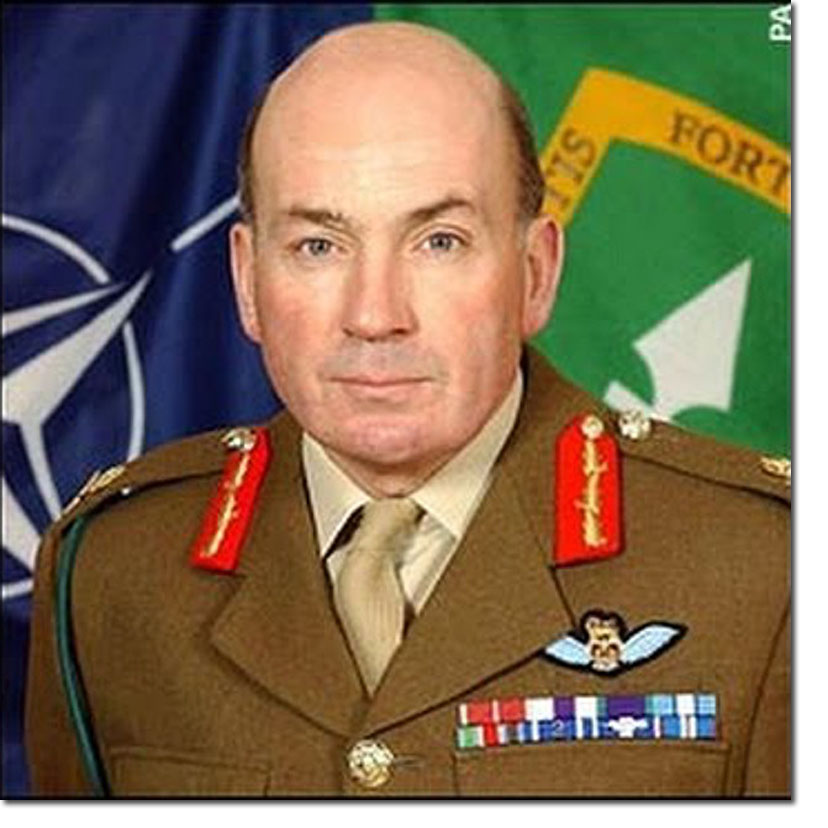|
|


|
|
Richard Dannatt (he later dropped the first name, Francis when he was 15) was born in Broomfield, Essex on 23 Dec 1950. His father was an architect, Anthony Dannatt and his mother was Mary Chilvers. He was educated at St Lawrence College, Ramsgate. He was persuaded to join the Green Howards before his training at Sandhurst and was commissioned in July 1971. As a platoon commander he won the Military Cross on his second tour of duty in Northern Ireland in 1972. In 1973 he took the opportunity of studying at University, sponsored by the army. He spent two years at Durham, spending his summer vacations on duty in Northern Ireland. On 11 Nov 1977, at the age of 26, he suffered a major stroke and spent two years recovering. He was persuaded to continue his army career and went to Staff College. He was promoted to major in Sep 1982 and appointed to chief of staff to 20th Armoured Brigade in West Germany. After more service in Ireland with the Green Howards he took up a staff post at the MoD as Military Assistant to the Minister of State in 1986. He was promoted to lieutenant-colonel and spent 3 years advising politicians on military matters.
In 1989 he became CO of the Green Howards and presided over their transition to an airmobile role so that they became part of 24th Airmobile Brigade. His sixth and last tour of duty in Northern Ireland was in 1991. He went back to Staff College for the Higher Command and Staff Course which brought him the rank of Colonel on 31 Dec 1991. He updated the ‘British Military Doctrine’ following the end of the Cold War. He was then posted for command in Bosnia and rewarded for his work there with the CBE. In April 2001, as a major-general he was appointed Assistant Chief of the General Staff. After 9/11 he was involved in planning for operations in Afghanistan and Iraq. In 2003 he was promoted to lieutenant-general and appointed to command the Allied Rapid Reaction Corps. He was invested as KCB in June 2004 (later upgraded to GCB) and in 2005 promoted to general and was Commander-in-Chief, Land Command, responsible for the day-to-day running of the army. At this time he had to reorganise the infantry which resulted in the loss of many regiments, including the Green Howards who then became the 2nd Battalion, the Yorkshire Regiment. On 29 Aug 2006 he was appointed Chief of the General Staff, the actual head of the army. He lobbied for an increase in defence expenditure so that the army could operate effectively in Iraq and Afghanistan. He also raised concerns over the accommodation and wages of soldiers in the UK. He was keen to raise his public profile so that he could campaign in the media, but this back-fired when sections of the press turned on him and accused him of attacking the government. In 2007 he visited Headley Court, a rehabilitation centre for wounded soldiers. Subsequently he was involved in raising money for a swimming pool and gym there which opened in 2010. He was involved in the negotiations over Prince Harry’s service in Afghanistan, at first blocking it then coming to an understanding with the press so that it could go ahead. He also made it clear that the army welcomed gays. In Aug 2008 he retired as Chief of the General Staff. He had been appointed Colonel of the Green Howards on 1 Dec 1994 and this ended in May 2003. He retired from the army in Feb 2009 and was appointed Constable of the Tower of London. He also advised David Cameron’s shadow cabinet on military matters. He wrote his autobiography ‘Leading From The Front’ published in 2010 in which he accused Gordon Brown of ‘malign intervention’ withholding funds for Tony Blair’s defence policy. In Nov 2010 he was made Baron Dannatt, sitting in the House of Lords as a crossbencher. Lord Dannatt, a devout Christian, lives in Norfolk with his wife Pippa. They had four children, 3 boys and a girl. One son, Bertie was a captain in the Grenadier Guards. |
Armed Forces | Art and Culture | Articles | Biographies | Colonies | Discussion | Glossary | Home | Library | Links | Map Room | Sources and Media | Science and Technology | Search | Student Zone | Timelines | TV & Film | Wargames